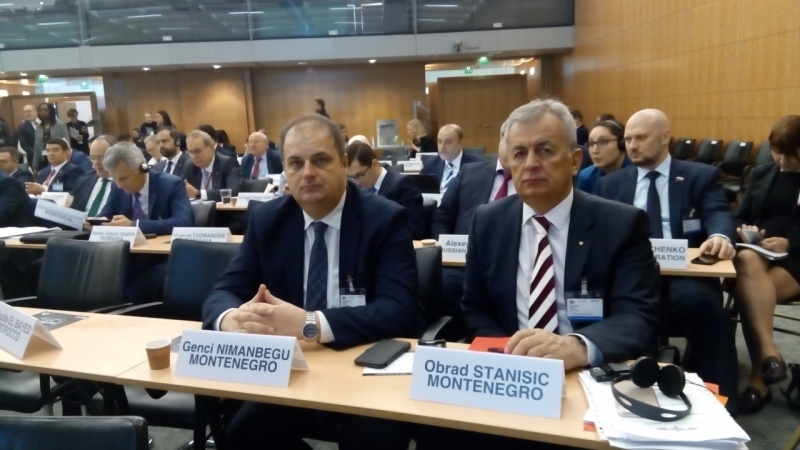On day two of the joint seminar, a meeting of the OECD Global Parliamentary Network, chaired by Mr Anthony Gooch, Director of the OECD Public Affairs and Communications, was held. He welcomed the participants in his introductory speech, thanked for their participation, and stressed the importance of comprehensive exchange of knowledge, especially given the topicality of the themes and the possibility of expanding the discussion on issues significant for the participants.
This was followed by a panel dedicated to the topic: “Multilateralism - Bridging Divides”, moderated by Angel Gurría, OECD Secretary General. Mr Andreas Schleicher, OECD Director for Education and Skills and Special Advisor on Education Policy to the Secretary-General, addressed participants in this part, on the topic: “Teaching for truth – The role of education policy in public trust”. On this occasion, the participants exchanged views on the quality of information usually available to users, their truthfulness and reliability, especially bearing in mind contemporary lifestyle, its speed and the possibility of losing value of the content as a consequence. In this context, the OECD’s Survey of Adult Skills (PIAAC) was presented to the participants. The Survey shows that education strengthens the cognitive and analytical capacities needed to develop, maintain, and (perhaps) restore trust in both close relationships as well as in anonymous others. With regard to the said, it was noted that the development of communication relations, continuous and strong confidence building in the process of information exchange is significantly contributed by education and trust through building and reinforcing literacy in individuals and reinforcing behaviours such as reading and writing on certain topics.
The joint meeting was continued by a panel devoted to the topic: “How the G20 is working towards a more inclusive world economy”, moderated by Ms Gabriela Ramos, OECD Chief of Staff, G20 Sherpa and Special Counsellor to the Secretary-General. During the panel, an update on the state of international cooperation with regard to the said topic was presented to the participants.
Afterwards, Mr Anthony Cox, Acting Director for Environment, OECD, and Timur Guel, Senior Energy Analyst, Energy Demand Outlook Division, International Energy Agency, spoke on the topic “Investing in climate, investing in growth // World Energy Outlook “. Having in mind the importance of the issues raised at the global level, they especially addressed the issues of opportunities, improvements and ways of meeting the climate goals, access to energy and air quality.
In the context of the discussion, participants of the meeting noted that governments around the world face the need to re-invigorate growth while improving livelihoods and urgently tackling climate change. OECD’s work on "Investing in Climate, Investing in Growth" shows that integrating measures to tackle climate change into regular economic policy will have a positive impact on economic growth over the medium and long term. A climate-friendly policy package can increase long-run output by up to 2.8% on average across the G20 by 2050 and if avoided climate damage are also taken into account, this rises to nearly 5%.
Case study “Making the Paris metropolitan area more resilient to the risk of flooding” was presented to participants of the meeting by Mr Charles Baubion, OECD Policy Analyst, Risk Management, Public Governance Directorate, and Ms Stephane Jacobzone, OECD Counsellor. They stressed the importance of large cities readiness to adequately respond to major climate risks. With regard to that, the OECD assessments of 2014 were presented to delegates, the economic impact of a major flood affecting Paris metropolitan area and recommendations to improve its resilience, as well as recent follow-up report on the progress made in implementing its recommendations. This case study shows the value of investing in risk prevention and offers options to overcome governance challenges. The presentation discussed how to create political momentum for reform after major shock events. It highlighted the costs of inaction for decision makers and the need to invest in a resilient future to preserve trust in government.
The following session of the NATO PA and OECD Joint meeting was on the topic “What’s the role of trade in inclusive growth?”. Mr
Ken Ash, OECD Director of Trade and Agriculture, moderated the session, while OECD analysis was presented to the participants. The analysis supports a much more integrated approach to policy making, with special reference to trade matter today - and its contribution to more inclusive growth.
The last session of day two of the NATO PA Economics and Security Committee and the Organisation for Economic Co-operation and Development (OECD) was devoted to the topic: “Doing Politics in New Ways: Co-creation in Politics”, when French MPs Mr Pacôme Rupin and Ms Amélie de Montchalin addressed the present. The discussion on the topic noted that in recent years, new digital tools have brought vast amounts of information to our fingertips and have significant influence on many fields of contemporary life, and thus changed the way political campaigns are designed and executed, while at the same time intensifying public scrutiny. The participants of the meeting jointly concluded that modern ways of communication significantly influence on raising the level of involvement of all stakeholders in policy making, overcoming differences between them and achieving common goals in this regard.
Members of the Standing Delegation of the Parliament of Montenegro to the NATO Parliamentary Assembly Mr Obrad Mišo Stanišić and Mr Genci Nimanbegu are taking part in the joint meeting of the Economics and Security Committee and the Organisation for Economic Co-operation and Development (OECD).
This year’s meeting is held within the Parliamentary Days of the Organisation for Economic Co-operation and Development (OECD). It provides the opportunity for direct exchange of information between NATO Parliamentary Assembly delegates and OECD experts on relevant topics, as well as the opportunity for bilateral meetings of parliamentarians in accordance with their interests.
The joint annual meeting of NATO PA and OECD continues tomorrow.












